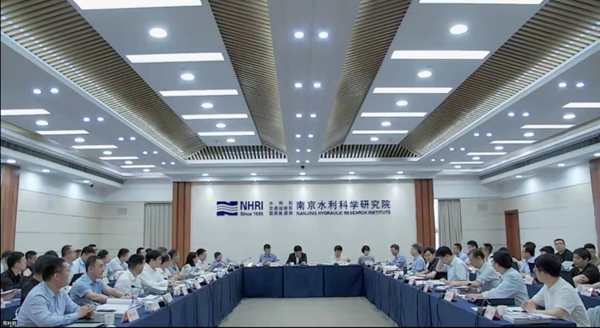
On May 28, 2025, NHRI organized a joint kick-off and implementation scheme demonstration meeting for Research and Development of Key Technologies for Leakage Diagnosis and Treatment of Asphalt Concrete Core Dams Under Complex Dam Construction Conditions (Project No.: 2024YFC3214900), a key special open-bidding project, and Research and Development of Technology and Equipment for Detecting Hidden Dangers of Termite Nests in Levee and Dam Engineering (Project No.: 2024YFC3211500), a key project, for the special project Water Resources and Water Environment Comprehensive Management in Key River Basins (e.g., the Yangtze and Yellow River Basins), under the "14th Five-Year" National Key R&D Program, in Nanjing. Over 60 participants, including responsible persons from Department of International Cooperation, Science and Technology and Department of Water Project Operation Management, MWR, and the Administrative Center for China's Agenda 21, project leads, research teams, partners and advisors, attended the meeting.
The projects invited 9 experts, including NIU Xinqiang, Academician of the Chinese Academy of Engineering and XIE Yimin, Fellow of the Australian Academy of Technological Sciences & Engineering, to form an advisory panel. The panel listened to reports on the implementation schemes of two projects and the first milestone assessment test scheme of the open-bidding project, carried out thorough discussions on the scientificity, innovativeness, rationality, and feasibility of the implementation schemes and the representativeness, comprehensiveness and operability of the test scheme, provided specific opinions and suggestions for improvement, and clearer guidance for the projects' follow-up implementation. The implementation scheme of two projects and the first milestone assessment test scheme of the open-bidding project were approved after review
Especially established by the Ministry of Water Resources with an open competition mechanism to select the best candidate for addressing the challenges of diagnosing and treating leakpage issues in high asphalt concrete core dams, represented by the Pangduo Hydropower Project, the project Research and Development of Key Technologies for Leakage Diagnosis and Treatment of Asphalt Concrete Core Dams Under Complex Dam Construction Conditions is led by NHRI, in collaboration with Hohai University, 715th Research Institute of China State Shipbuilding Corporation Limited, Sinohydro Foundation Engineering Co., Ltd., Chongqing University, and MWR General Institute of Water Resources and Hydropower Planning and Design, with a implementation span of three years. Aiming to collectively tackle the challenges of "unclear risk prediction, undetected seepage, inaccurate seepage point identification, and difficult treatment" for leakage defects in asphalt concrete core dams in regions with "high seismic intensity, high altitude, extreme cold, and deep overburden", the project follows the overall research approach of "risk zone prediction - leakage zone detection - leakage path tracking - seepage channel grouting" to develop relevant core technologies and equipment. By making breakthroughs in precise seepage point positioning, the project will achieve comprehensive progress in risk zone prediction, leakage zone detection, and seepage point treatment.
The project Research and Development of Technology and Equipment for Detecting Hidden Dangers of Termite Nests in Levee and Dam Engineering is led by NHRI, in collaboration with Hubei Flood and Drought Disaster Prevention Center, Shandong University, Anhui Hongtu Instrument and Equipment Co., Ltd., with the implementation span of three years. Focusing on the theoretical gaps and technical constraints of "unclear disaster mechanisms and inaccurate detection and localization" of termite nests in levee and dam engineering, the project aims to reveal the disaster-triggering mechanisms and precursor characteristics of harmful animal burrows in levees and dams, and develop related equipment, to form a package of intelligent diagnosis and detection equipment systems that integrate "rapid reconnaissance survey - precise detailed inspection - AI-powered verification".
The successful convention of this meeting marked the two projects' entry into full implementation phase. The project teams pledged to continue increasing research efforts to realize high-quality breakthroughs in high dam leakage diagnosis and treatment, and AI-powered identification, prediction and treatment of animal burrows in levees and dams, to provide robust support for ensuring China's water security through new productive forces.
